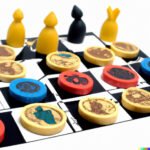Board games have long been a favorite pastime for children and adults alike. They provide an opportunity for fun, laughter, and friendly competition. But did you know that classic board games also play a crucial role in the development of 6-year-olds?
In this article, we will explore the importance of classic board games specifically designed for 6 year olds. We will delve into the numerous benefits these games offer, both in terms of their developmental and educational aspects. Additionally, we will provide you with a curated list of the top 5 classic board games suitable for 6 year olds, complete with descriptions and features.
When it comes to choosing the right classic board game for your 6 year old, there are several factors to consider. We will guide you through this process by highlighting important pointers to help you make an informed decision. Furthermore, we understand that teaching young children to play these games can sometimes be challenging. Therefore, we will offer some valuable tips on how to teach your 6 year old to play classic board games effectively, emphasizing patience and learning strategies.
Moreover, we firmly believe that classic board games not only serve as recreational activities but also foster family bonding. Discover exciting ways to engage the entire family while playing these timeless classics together. Furthermore, we will explore how you can adapt traditional board games to suit the needs and abilities of 6 year olds through variations and simplifications.
Finally, if you’re wondering where to buy classic board games for your 6 year old, we have got you covered. We will provide insights into online and physical stores where you can purchase these engaging games.
Join us on this journey as we uncover the world of classic board games specially crafted for the delight and development of 6 year olds. By the end of this article, you will gain a comprehensive understanding of why these traditional entertainment options are vital for your child’s growth and development.
Benefits of Playing Classic Board Games for 6 Year Olds
Playing classic board games provides numerous benefits for 6-year-olds, both in their development and education. These games offer a unique opportunity to enhance various skills while having fun at the same time.
One of the most significant benefits of playing classic board games is the development of cognitive skills. Games like chess or checkers require critical thinking, problem-solving, and strategic planning, which can greatly improve a child’s ability to analyze situations and make decisions. Additionally, these games help children develop logical reasoning and enhance their memory and concentration skills.
Classic board games also have a positive impact on social and emotional development. Playing with others promotes teamwork, cooperation, and sportsmanship, as children learn to take turns, follow rules, and respect others’ decisions. Furthermore, these games often involve friendly competition, teaching children how to handle winning and losing gracefully.
In terms of education, classic board games can contribute to language development. Games like Scrabble or Boggle encourage word formation, vocabulary building, and spelling practice. As children engage in conversations during gameplay, they also enhance their communication skills by expressing their thoughts and listening to others.
Moreover, board games introduce basic mathematical concepts such as counting, number recognition, and simple arithmetic calculations. Games like Monopoly or Candy Land provide opportunities for players to count spaces or money while developing an understanding of numbers.
To summarize:
- Classic board games promote cognitive skills such as critical thinking and problem-solving.
- They facilitate social and emotional development through teamwork and sportsmanship.
- Board games contribute to language development by encouraging word formation and vocabulary building.
- They introduce basic mathematical concepts such as counting and number recognition.
By incorporating classic board games into a 6-year-old’s playtime routine, parents can help foster important developmental milestones while creating enjoyable learning experiences for their child.
Top 5 Classic Board Games Suitable for 6 Year Olds
There are many classic board games that are suitable for 6 year olds and can provide hours of fun and learning. Here are the top 5 classic board games that are perfect for this age group:
1. Candy Land: This colorful and engaging game is a favorite among young children. Players take turns drawing cards and moving their character along the winding path to reach the Candy Castle. The game teaches color recognition, counting, and turn-taking skills.
2. Chutes and Ladders: This popular game is a great way for young children to practice counting and number recognition skills. Players spin a spinner and move their character up the ladders or down the chutes based on the number they land on. The first player to reach the end wins.
3. Hi Ho Cherry-O: This fun-filled game is all about counting and simple math skills. Players take turns picking plastic fruits from their tree and adding them to their bucket. But watch out for the pesky bird who wants to steal your cherries. The first player to fill their bucket wins.
4. Memory: This classic memory matching game is not only enjoyable but also helps improve concentration and cognitive skills in young children. Players take turns flipping over cards to find pairs of matching pictures or numbers. The player with the most matches at the end of the game wins.
5. Operation: This exciting skill-based game challenges children to use tweezers to remove different “ailments” from a patient’s body without touching the sides of the openings. It promotes hand-eye coordination, fine motor skills, and patience.
These classic board games offer age-appropriate challenges that help develop important skills in 6 year olds while providing entertainment at the same time. Whether it’s learning colors, numbers, or social skills like taking turns, these games are educational and enjoyable for young children.
You can find these classic board games suitable for 6 year olds at various online retailers such as Amazon, Walmart, and Target. Many of these games also have physical copies available in toy stores or department stores. So gather the family, set up a game night, and watch your child’s skills and confidence grow as they engage in these timeless classics.
How to Choose the Right Classic Board Game for a 6 Year Old
When choosing the right classic board game for a 6-year-old, there are several factors to consider in order to ensure an enjoyable and age-appropriate experience. Firstly, it is important to consider the child’s skill level and interests. At this age, children are developing their cognitive abilities and fine motor skills, so games that promote these areas of development can be beneficial.
One factor to consider when choosing a classic board game for a 6-year-old is the complexity of the game. It is important to choose a game that matches the child’s abilities and understanding. Games with simple rules and easy-to-follow instructions are ideal for this age group. Additionally, games that involve counting, color recognition, or matching can help reinforce early learning concepts.
Another factor to consider is the duration of the game. Young children may have shorter attention spans, so it is best to choose games that can be played in a relatively short amount of time. This will help keep them engaged and interested throughout the game.
Additionally, considering the number of players required for a game is important when choosing a board game for a 6-year-old. Most young children enjoy playing games with their friends or family members, so it is beneficial to choose a game that accommodates multiple players. This allows them to learn valuable social skills such as taking turns and following rules.
Tips for Teaching 6 Year Olds to Play Classic Board Games
Playing classic board games can be a great way to teach 6-year-olds important skills such as patience and learning strategies. However, teaching them how to play these games effectively can sometimes be challenging. In this section, we will discuss some tips that can help parents and educators successfully teach 6-year-olds how to play classic board games.
First and foremost, patience is key when teaching 6-year-olds how to play board games. It’s important to remember that they are still developing their cognitive and social skills, so they may take longer to understand the rules and strategies of the game. As adults, we need to have patience and provide clear instructions while allowing them enough time to process the information.
One effective strategy for teaching 6-year-olds how to play classic board games is by breaking down the rules into simpler terms. Start by explaining the basic objective of the game in a way that they can easily understand.
For example, if you’re playing a game like Snakes and Ladders, you could explain that the goal is to reach the top of the board by rolling a dice and moving your marker accordingly. Once they grasp the main concept, you can then introduce additional rules one step at a time.
Another helpful strategy is using visual aids or props to make the learning process more engaging for 6-year-olds. You might consider using colorful tokens or markers, creating posters with simplified versions of game instructions, or even acting out certain game scenarios with toys or puppets. This hands-on approach can help them better visualize and internalize the rules of the game.
Classic Board Games for 6 Year Olds and Family Bonding
Family bonding is an essential part of a child’s upbringing, and classic board games provide a perfect opportunity for this. Playing board games together as a family not only creates lasting memories but also helps in building stronger relationships and developing important social skills for 6-year-olds.
One of the main benefits of playing classic board games as a family is the opportunity for quality time spent together. In today’s fast-paced world, finding activities that allow for uninterrupted family time can be challenging.
Board games provide an excellent solution as they require players to sit down together in a designated space, allowing for focused interaction and conversation. This dedicated time allows families to connect on a deeper level while having fun and enjoying each other’s company.
Classic board games also help 6-year-olds develop crucial social skills such as taking turns, following rules, and good sportsmanship. These games teach children how to win gracefully and accept defeat with dignity. By engaging in friendly competition within the family setting, children learn the importance of fairness, respecting others’ abilities, and showing empathy towards their opponents.
Moreover, playing classic board games as a family can greatly enhance communication skills in 6-year-olds. Games often involve strategy or problem-solving, requiring players to think critically and articulate their thoughts aloud. This encourages children to express themselves clearly, listen actively to others’ ideas, and engage in meaningful discussions with their family members. Such interactions contribute to the development of language and communication skills that are essential for academic success and navigating social situations outside of the home.
Adapting Classic Board Games for 6 Year Olds
When it comes to playing classic board games with 6 year olds, it is important to consider their age and developmental level. While these games may be designed for older children or adults, there are ways to adapt them to suit the abilities of younger players. By making some simple variations and simplifications, you can ensure that the game remains enjoyable and engaging for 6 year olds.
Variations
One way to adapt classic board games for 6 year olds is by introducing variations to the rules. This can make the game more accessible and easier for them to understand. For example, in a game like Monopoly, you can simplify the buying and selling of properties by using a smaller selection of properties or omitting this aspect altogether. Instead, focus on other elements of the game such as rolling the dice, moving around the board, and collecting cards.
Another variation that can be made is to modify the goal or objective of the game. For instance, in a game like Scrabble where players typically aim to create words using letter tiles, you can change the goal to simply matching letters or creating shorter words. This allows younger players to still participate and enjoy the game without feeling overwhelmed by complex word-building strategies.
Simplifications
In addition to variations, simplifying certain aspects of classic board games can also make them more accessible for 6 year olds. This involves breaking down complex rules or mechanics into simpler steps that they can grasp easily.
For example, in a game like Chess which has numerous rules and strategies, you can start by teaching 6 year olds basic moves such as how each piece can move across the board. As they become more familiar with these concepts, gradually introduce more advanced strategies.
Furthermore, simplifying components of classic board games such as game boards or pieces can also help make them more suitable for younger players. When playing games like Clue or Risk, for instance, consider using larger game boards and pieces that are easier for 6 year olds to handle. This way, they can fully engage with the game without struggling to manipulate small tokens or cards.
By adapting classic board games for 6 year olds through variations and simplifications, you can provide them with an enjoyable and age-appropriate gaming experience. These adaptations ensure that the rules and mechanics of the game align with their developmental abilities while still providing opportunities for learning and skill-building.
Where to Purchase Classic Board Games for 6 Year Olds
When it comes to purchasing classic board games for 6-year-olds, there are a variety of options available both online and in physical stores. The convenience of online shopping allows parents to browse through a wide selection of games from the comfort of their own homes. Popular online retailers such as Amazon and Walmart offer a vast array of classic board games that are suitable for 6-year-olds.
One advantage of purchasing board games online is the ability to read reviews from other customers who have already bought and played the game. These reviews can give parents valuable insight into the quality, difficulty level, and age-appropriateness of the game. Online retailers often provide detailed product descriptions and ratings, making it easier for parents to make informed decisions about which games to purchase.
On the other hand, physical stores also offer advantages when it comes to buying board games for 6-year-olds. Many toy stores have dedicated sections or aisles specifically for board games, making it easier for parents to find age-appropriate options. In-store shopping also allows children to physically see and touch the games before making a decision, which can help spark excitement and anticipation.
Additionally, physical stores often employ knowledgeable sales associates who can provide recommendations based on a child’s age, interests, and skill level. They can answer questions about specific games and suggest alternatives if a particular game is out of stock or not available. Moreover, shopping in local brick-and-mortar stores supports small businesses within one’s community, fostering a sense of connection with neighbors.
Conclusion
In conclusion, classic board games play a vital role in the development of 6 year olds. These games offer numerous benefits, both in terms of their educational and developmental aspects. They promote important skills such as critical thinking, problem-solving, and social interaction, all of which are crucial for a child’s growth and learning.
By engaging in classic board games, 6 year olds have the opportunity to enhance their cognitive abilities. These games require them to think strategically, make decisions, and anticipate the consequences of their actions. Moreover, they provide a platform for children to learn essential academic skills like number recognition, counting, word formation, and reading comprehension.
When choosing a classic board game for a 6 year old, it is important to consider factors such as their interests and abilities. It is also necessary to be patient while teaching them the rules and techniques of each game. By incorporating various learning strategies tailored to their needs, parents and caregivers can create an enjoyable and effective learning experience for these young players.
Additionally, classic board games provide an excellent opportunity for family bonding. Engaging in these activities together not only fosters quality time spent with loved ones but also reinforces the values of teamwork, patience, and good sportsmanship. Family game nights become a fun way for parents to connect with their children while creating lasting memories.
Frequently Asked Questions
What Games Are Best for 6 Year Olds?
When it comes to choosing games for 6-year-olds, it’s important to consider their developmental stage and interests. Games that are best suited for this age group are typically ones that promote social interaction, cognitive development, and fine motor skills.
Some popular choices include simple card games like Uno or Go Fish, cooperative games like The Sneaky, Snacky Squirrel Game, and puzzle games that challenge their problem-solving abilities. Outdoor games like tag or hopscotch also provide great opportunities for physical activity and socialization.
Do 6 Year Olds Play Board Games?
Yes, 6-year-olds can definitely play board games! Board games are not only fun but also offer numerous benefits for their development. Playing board games helps children improve essential skills such as counting, taking turns, following rules, and making decisions.
It also encourages family bonding as it provides an opportunity for quality time together. It’s important to choose board games that are age-appropriate for 6-year-olds with simpler rules and shorter playtimes to maintain their engagement and enjoyment.
What Is the Most Popular Traditional Board Game?
Monopoly is arguably the most popular traditional board game worldwide. Created in the early 20th century, it has stood the test of time and continues to be enjoyed by people of all ages across different cultures. In Monopoly, players compete to buy properties, collect rent from opponents, and aim to bankrupt each other through strategic decision-making and financial management.
The game’s enduring popularity can be attributed to its blend of luck and skill elements, its competitive nature, and its ability to bring friends and families together for hours of entertainment. However, it’s worth noting that there are many traditional board games out there with regional or cultural significance depending on where you are in the world.

I love playing all kinds of games – from classics like Monopoly to modern favourites like Ticket to Ride.
I created this blog as a way to share my love of board games with others, and provide information on the latest releases and news in the industry.





